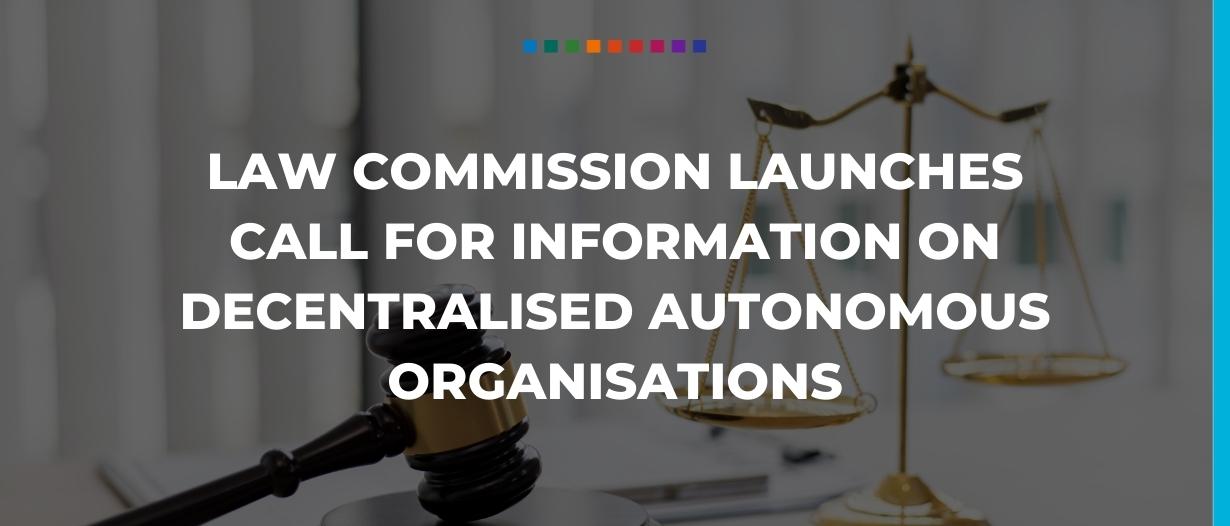Estimated reading time: 4 minutes
The Law Commission of England and Wales has launched a research inquiry asking users and other experts for information about how decentralised autonomous organisations (DAOs) can be characterised. This is being done with a view to finding ways to accommodate legal implementation within England and Wales now and in the future.
DAO uses and how they can be used
A DAO is a new type of organisational structure involving multiple participants online, that may rely on blockchain systems, smart contracts, or other software-based systems.
DAOs are increasingly important in the context of crypto-token (cryptocurrency) and decentralised finance markets. They are often contrasted with more traditional forms of organisations, perhaps functioning privately, operating with less transparency, and having more centralised governance structures.
While DAOs are sometimes likened to existing legal forms, such as general partnerships or unincorporated associations, there are some key features that distinguish them from existing forms.
Some DAOs include a recognised legal form or incorporated entity, while many are involved with the development of code that is used to create smart contracts. Many DAOs also use smart contracts to automate or program some elements of their internal activity.
Often those smart contracts are open-source and are themselves used on open-source blockchain systems.
Examples of DAOs include social structures or organisations involving multiple participants set up for investment purposes—including investing in trading crypto-tokens and non-fungible tokens (NFTs), as well as fundraising or charitable purposes.
Many DAOs are also involved in software engineering—developing, modifying, and maintaining open-source software infrastructure (such as blockchain systems or decentralised finance applications).

The Law Commission’s initiative
Many thousands of DAOs exist today, but few appear to be structured using the law of England and Wales.
Huge amounts of value flow through, are created, used and sometimes lost by DAOs. This raises questions about their legal status, the liabilities of those who participate in them, and the rules and regulations that apply to them.
The UK government has asked the Law Commission to investigate each of these issues. This investigation will reap a scoping report, considering how DAOs can operate under the existing law of England and Wales, additionally identifying any areas of law or regulation in need of further consideration and potential reform.
The call for evidence, open for 10 weeks until 25 January 2023, will contribute towards the Law Commission’s scoping report.
Professor Sarah Green, the law commissioner for commercial and common law, said,
“DAOs are said to offer multiple benefits to market participants, incentivising cooperation and innovation, levelling playing fields, reducing the scope for human error, lowering costs, and increasing transparency. Yet their legal and regulatory status is unclear.
“Our work will aim to build consensus on the best ways of describing the constituent elements of DAOs and to highlight ways in which the law of England and Wales might foster their development.”
Required information for the DAO enquiry
In the call for evidence, the Law Commission sets out its current understanding of the DAOs landscape and asks for further information on a variety of issues, including:
- When would a DAO choose to include an incorporated entity into its structure?
- What is the status of a DAO’s investors / token-holders?
- What kind of liability do or should developers of open-source code have (if any)?
- How does / should the distinction between an incorporated company (or other legal form or incorporated entity) involved in software development and an open-source smart contract-based software protocol operate as a matter of law?
- How do DAOs structure their governance and decision-making processes?
- How do money laundering, corporate reporting and other regulatory concepts apply to DAOs, and who is liable for taxes if the DAO makes a profit?
- Which jurisdictions are currently attractive for DAOs and why?
The Law Commission encourages anyone with experience with, or expertise in, DAOs to respond. It is not necessary to answer every question.























